Research
Mak-RIF engages Private Sector, NGOs, and CSO representatives in Uganda Review of the Mak-RIF Research Agenda
Published
2 years agoon
By
Mak Editor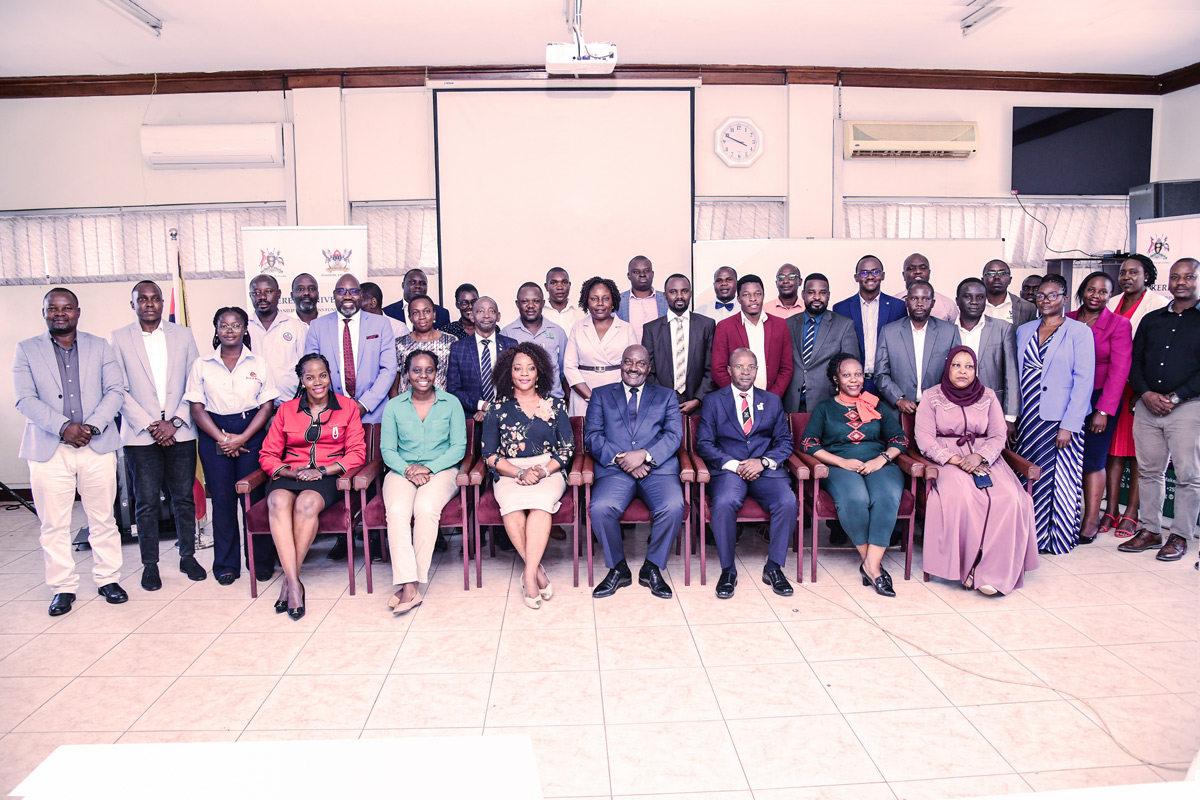
On November 9th, 2023, the Mak-RIF Grants Management Committee (GMC) and Secretariat convened representatives from the Private Sector, Non-Governmental Organizations, and Civil Society Organizations in the Makerere University College of Computing and Information Sciences Conference Room. This was yet an opportunity for Mak-RIF to share her achievements to date while reflecting on the guiding Research Agenda. It was also an opportunity for participants to garner feedback from the engagement participants to inform the review of the Mak-RIF Research Agenda.
It is usually important to know who is in the room not only for purposes of knowing who is with you and or accountability but also to enhance networking and collaborations that might emanate from the networking opportunities therein. In this regard, this engagement started with self-introductions. Participants included representatives from Joint Medical Stores, Uganda Tourism Association, Legacy Road Safety Initiative, Environmental Rights NGO, Uganda Christian University, Pathfinder International, USAID Uganda Family Planning Activity, Uganda Law Society, Save for Health Uganda, Aloesha Organic, Private Sector Foundation Uganda, Radio Simba, Busitema University, International Rescue Committee, Green Herbs Uganda Limited, Uganda Catholic Medical Bureau, Uganda Moslem Catholic Bureau, Uganda Manufacturers Association, Zimba Women, Fundi Bots, Water for People, M’Omulimisa, Teenage Mothers and Child Protection Organization, RECO Industries, Uganda Connect among others.
Prof. Fred Masagazi Masaazi, Chairperson of Mak-RIF GMC welcomed all participants noting that for the last five years, Mak-RIF’s work has been guided by the Research Agenda currently under review. “We are looking forward to receiving views from all of you representatives of stakeholders in the country and beyond to further inform the review of the Mak-RIF Research Agenda,” Prof. Masagazi said. He recognized the continuous support from all stakeholders since 2019 during the inception stages towards building the Mak-RIF story. “Several of you or your colleagues in the institutions and organizations in which you serve are part of research teams and have continued to support our researchers in several ways. Some of you have joined in our research and innovation outputs dissemination sessions, thank you all” he added. He highlighted some questions to guide the review of the Mak-RIF Research Agenda including the following;
- Has the Mak-RIF met community expectations yet? If not, what else can be done?
- Is there a need to develop a new Research Agenda or even review the existing one?
- Do the prevailing socio-economic conditions require a new Research Agenda?
- What should be included in the new Research Agenda?
- Would all our ideas contribute to Uganda’s National Development Plan, Sustainable Development Goals, Sector Priorities etc.?
- Do our ideas rhyme with the National Development Plan? Can we work together to translate Makerere University into research-led university?
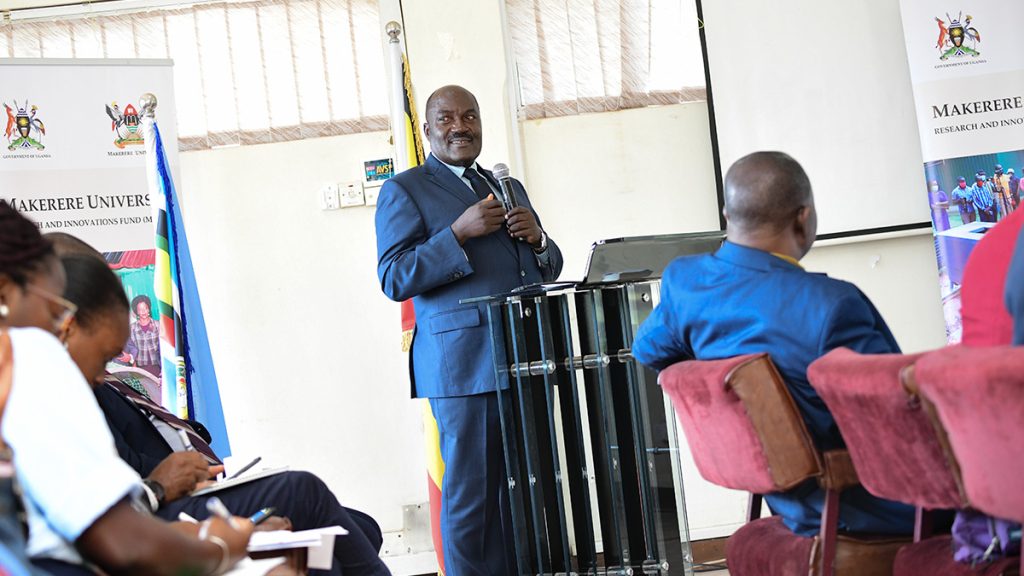
“Our interest is in knowing from you our meeting participants which other areas we can conduct research in. What else can we do together? We still need additional funds to support research, where else can the university source for funding? Can we work together to source more funds because we cannot rely on Government funding alone?” Prof. Masagazi said. He further guided the engagement participants saying that Mak-RIF shall implement all ideas provided they speak and are in line with the National Development Plan, Sustainable Development Goals, Sector Priorities as well as the Makerere University Strategic Agenda of becoming a research-led institution. He concluded his welcome note by calling upon all participants to secure time and interact with the Mak-RIF website for additional information about the ongoing research and innovation work.
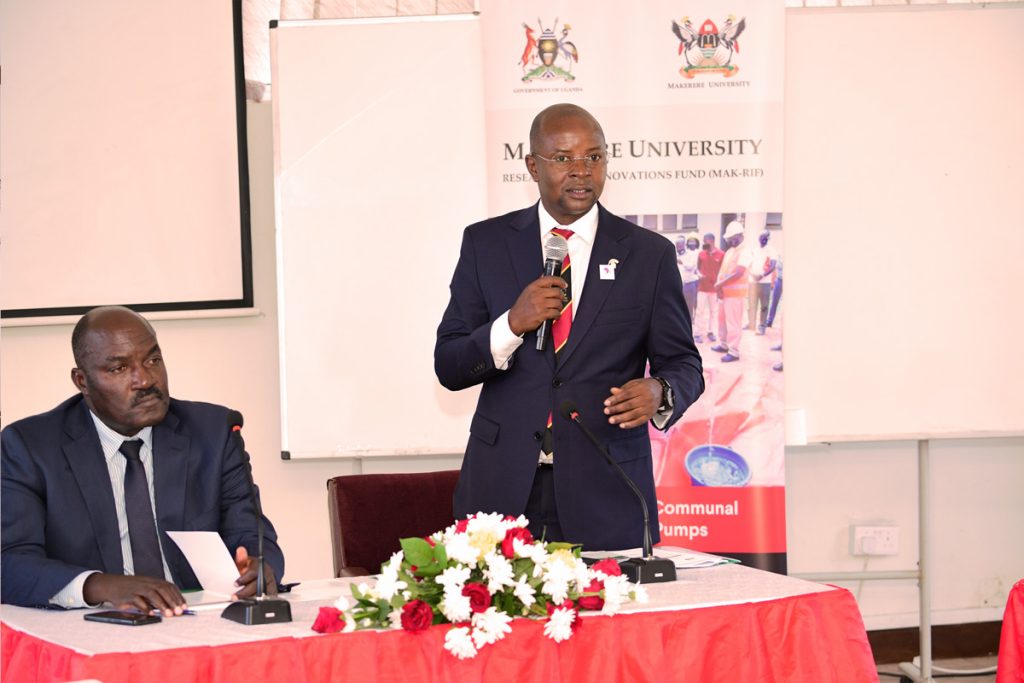
Prof. Edward Bbaale, Director of the Directorate of Research and Graduate Training representing Prof. Barnabas Nawangwe, Vice Chancellor Makerere University officially opened this engagement and later chaired the discussion session to further generate additional input to the operational Mak-RIF Research Agenda. He thanked all participants for honoring the invitation noting that without such engagements the university cannot easily achieve its strategic objectives and goals. He reechoed the fact that Mak-RIF is currently supporting 1,061 multidisciplinary research and innovation projects (including 117 PhD awards and 41 multiyear projects our most recent awardees). These projects receive funding, technical and non-technical support necessary to conduct development research and generate innovative solutions directed towards addressing diverse challenges in the communities in which we live and serve.
Prof. Bbaale also appreciated all researchers and innovators not only from Makerere University but also from other institutions which were represented in the day’s engagement and embraced all the previously shared funding opportunities, prepared and submitted applications to benefit from the Government Fund, saying that it is the way to go. “Thank you for remaining open to partnering with researchers from Makerere University to apply for funding and later implement the projects. It is through the Mak-RIF initiative that Makerere University is enabling several university faculty, students, administration, and collaborating institutions including the Government, Private Sector, Non-Governmental Organizations, and Community Service Organizations to contribute to the local generation of translatable research and scalable innovations that address key gaps required to drive Uganda’s development agenda” he added. Prof. Bbaale also emphasized the need to join efforts to scale research and innovation outputs within Makerere University but also in Uganda noting that scaling research and innovation outputs to the market is a task for all of us.
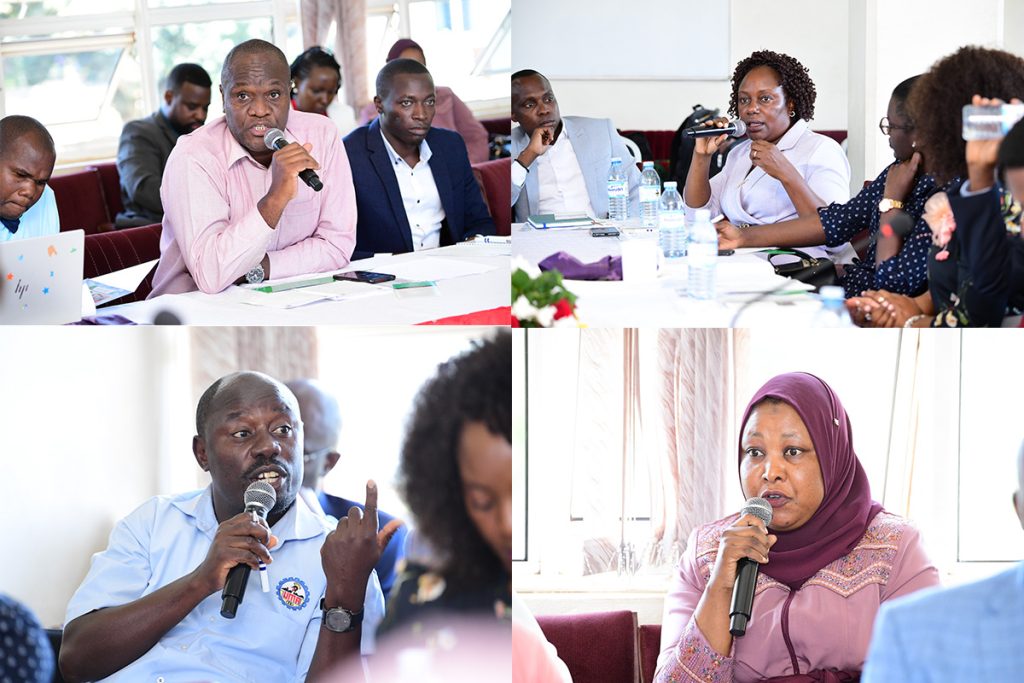
After Prof. Bbaale delivered the Vice Chancellor’s remarks, Dr. Roy William Mayega, the Coordinator of Mak-RIF shared a highlight of how far the Mak-RIF Research Agenda had guided operations since 2019. He noted that the Mak-RIF Research Agenda currently comprised of 14 Themes including the following;
- Transforming the agricultural sector
- Sustainable health
- Re-imaging Education
- Water, sanitation and environmental sustainability
- Harnessing the social sector to drive development
- Harnessing tourism, wildlife and heritage to drive development
- Sustainable Planning, finance and monitoring
- Leveraging public service and local administration for efficient service delivery
- Defense and security: Achieving sustainable peace and stability
- Strengthening law, governance, human rights and international cooperation
- Harnessing Information and Communication Technology to drive development
- Manufacturing, science and technology as tools to accelerate development
- Catalyzing business and enterprise
- Energy and Minerals as drivers of rapid economic development.
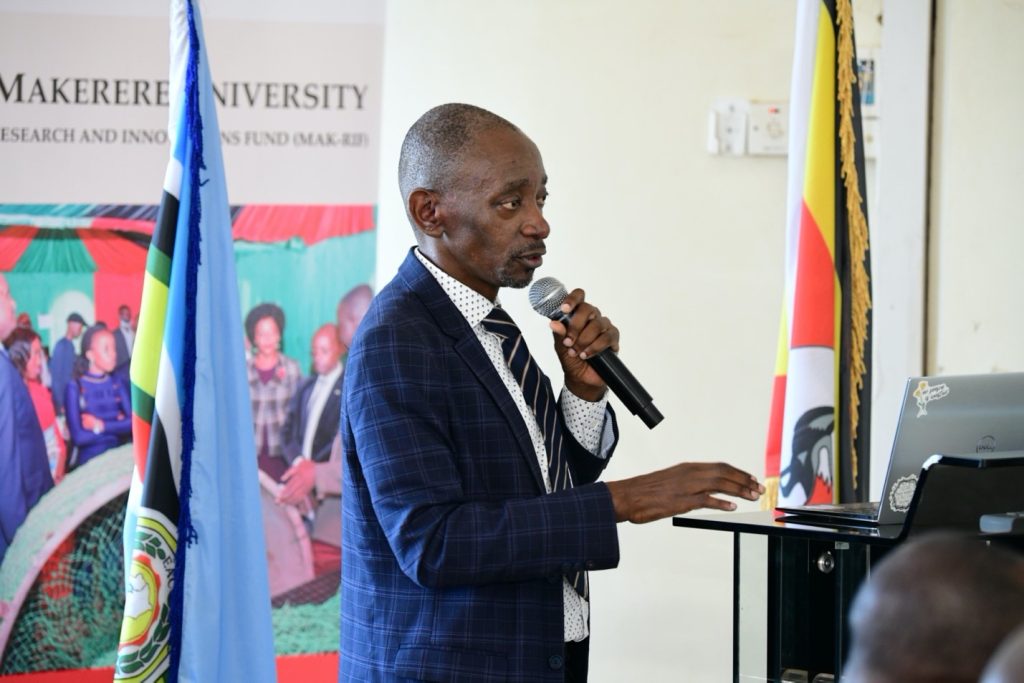
Dr. Mayega also shared examples of research and innovation outputs emanating from the fund. These include the following;
- An interrogation of Tax Education Gaps in the Informal Sector and how they can be leveraged in broadening the Tax Base,
- Another project is exploring to leverage music as therapy for emotional distress of cancer patients,
- Solar Powered Autoclaves for use in Rural Health Centers, The Pedal-Operated Seed Cleaner,
- An electronic partograph for improved monitoring of labor, to reduce maternal mortality,
- Integration of on – and off-grid decentralized renewable energy systems: Enabling Uganda’s largest distributor UMEME to pilot the integration of off-grid decentralized renewable energy systems with grid systems to extend electricity access to unserved communities,
- The Organ and Tissue Biobanking project at the Makerere University College of Health Sciences,
- A project on Transforming Presumptive Age Estimation in Uganda: Methods, Certainty and The Law,
- The Touchless Hand Washing device currently being used in different hospitals and community markets,
- Value addition to Sorghum and Potatoes supporting farmers in South Western Uganda to earn a living and avoid wastage of produce among other projects shared on the Mak-RIF Website https://rif.mak.ac.ug/
During the discussion session, several participants applauded the current Research Agenda noting that it was well thought out and should continue to guide Mak-RIF Operations. The engagement participants also shared some ideas to further inform the review of the running Research Agenda. These included the following;
- Radio stations being the most popular means of communication, we need to carry out audience analysis on television, radio, and even social media, identify and allocate resources to generate the right content, and further leverage technology innovations in both broadcast and print media.
- Youth unemployment and emerging issues as a result of this including skills development/training, tracking and taking into consideration the changing needs of the business world so as to re align Uganda’s training approaches,
- Herbal medicines and the indigenous innovators, how can we support processes to establish the efficacy of these products?
- Can we become more intentional about supporting researchers and innovators through the processes of Intellectual Property acquisition? It is important that Memorandums of Understanding are drafted, reviewed, and signed with relevant Registration Services Bureaus.
- It was also suggested that there is a need to continue supporting efforts to transform research outputs into economically viable and scalable innovations and to inform policy review and cause impact.
- Collaborations and partnerships with the private sector to further scale research and innovation outputs. At this engagement, Uganda Catholic Medical Bureau, Uganda Moslem Medical Bureau, Uganda Manufacturers Association, Water for People, and Uganda Law Society (specifically supporting Intellectual Property Rights acquisition processes and Revenue and Tax sensitization) among other organizations openly expressed interest in partnering with Mak-RIF to review and move forth some of the innovations within specific and related working areas.
- There is a need to support product development and packaging efforts to fit the national, regional, and international markets.
- We need to remain intentional in marketing the work we are doing within and outside Uganda.
- In an effort to achieve sustainable health, financing health insurance for example is a key issue. How can the National Insurance Scheme be further informed and supported through the work we are all doing? How can we contribute to the Global Health Security-related efforts in Uganda?
- For the case of agriculture, how can farmers adopt more organic agriculture so that we can even fight some of the non-communicable diseases with organic agricultural products? Could we also explore more involvement of the rural communities in the research and innovations we are working on? This would enable us to further harness indigenous knowledge. Establishing linkages with the informal sector is paramount.
- Could we also re-look at the various existing themes and integrate some of them that speak to each other? In so doing we are dealing with the replication of efforts and knowledge among others.
- Can we allocate some resources to further enhance our visibility (showcase what good we are doing) to key stakeholders including the Government of the Republic of Uganda in an effort to solicit for additional funding?
- There is a need to identify the Research Agenda niche thematic areas within which we can capitalize on to further publicize the fund and attract additional funding. We can harness the low-hanging fruits and benefit from pushing the agenda forth by leveraging these.
- In Uganda, road safety is crucial given the increasing number of traffic injuries, rescue of crash victims and crash data management are important aspects we should also plan to include in the Research Agenda. The research question could be; How can we have safe roads and attain safe travels for all if not majority of the road users?
- There is also a need to relook at and up research on Artificial intelligence in addition to early warning systems for natural disasters, early diagnosis of non-communicable diseases, strengthening community health systems, big data for industry, occupational health and safety, issues of regulation, and community accountability among others.
- Specifically, under theme 12, innovations developed, tested, iterated, and revised accordingly should reach the targeted end users. How do we commercialize the research and innovation outputs developed to date?
- What else can we do together to reduce or even avert teenage pregnancy? How can we further support teenage mothers?
- What can we do to improve the management of poison victims in Uganda? Can we do away with poisoning and its related effects in the country?
- For tourism, how can we avoid over reliance on international tourism? Can we expound our products range? Strengthen our human resource, explore virtual tours etc.
- It would be helpful to have a theme on cross-cutting issues for example indicating that fund beneficiaries are primarily Makerere University staff although others can join the project teams, how the 14 themes feed into the overarching country development themes etc.
- We need to have a theme speaking to research on safe water given the dire need now for us to ensure access to safe water for all.
- ETC.
Prof. Bbaale thanked the engagement participants for their active participation during the discussion session noting that all the input gathered was going to be further synthesized and made ready to inform Mak-RIF Research Agenda. He reechoed the fact that all input to the Mak-RIF Research Agenda needed to speak to and be in line with the National Development Plan, Sustainable Development Goals, Sector Priorities as well as the Makerere University Strategic Agenda of becoming a research-led institution. He wished all participants the very best saying that Makerere University is focused on building for the future for God and our country.
Prof. Bbaale thanked the engagement participants for their active participation during the discussion session noting that all the input gathered was going to be further synthesized and made ready to inform Mak-RIF Research Agenda. He reechoed the fact that all input to the Mak-RIF Research Agenda needed to speak to and be in line with the National Development Plan, Sustainable Development Goals, Sector Priorities as well as the Makerere University Strategic Agenda of becoming a research-led institution. He wished all participants the very best saying that Makerere University is focused on building for the future for God and our country.
Media mentions
- Uganda Broadcasting Corporation News Bulletin on November 9th, 2023 https://youtu.be/Sbc78ojHu30?si=6fnqIrK_Bi7vGcjo
- Bukedde Television on November 10th, 2023
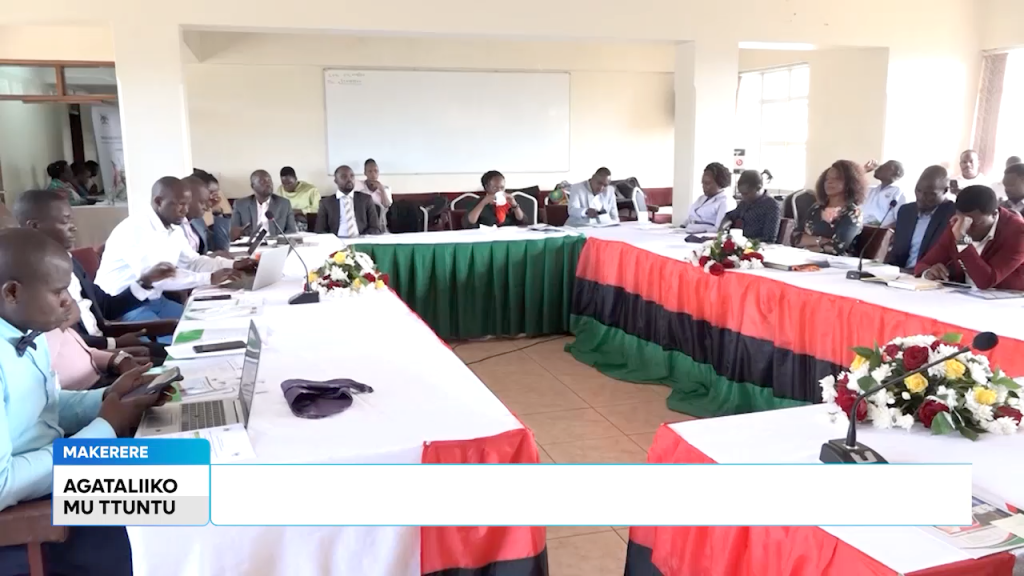
By: Harriet Adong, Mak-RIF Communications Officer
Contributors
Mrs. Phoebe Lutaaya Kamaya, Mak-RIF Deputy Coordinator
Ms. Evelyne Nyachwo, Mak-RIF Research Support Officer

You may like
-


Mak News Magazine: February 2026
-


Mak 76th Graduation Ceremony: CoNAS Presents 16 PhDs & Best Performing Male Student in the Sciences
-


CAES Presents Overall Best Performing Student in the Sciences & a Record 28 PhDs at the 76th Graduation Ceremony
-


Over 9,200 to graduate at Makerere University’s 76th Graduation
-


Mak Selected to Host Alliance for African Partnership Africa Office
-


Mak hosts First African Symposium on Natural Capital Accounting and Climate-Sensitive Macroeconomic Modelling
Research
Call for PhD Student Fellowships under H-DATA
Published
3 weeks agoon
February 6, 2026By
Mak Editor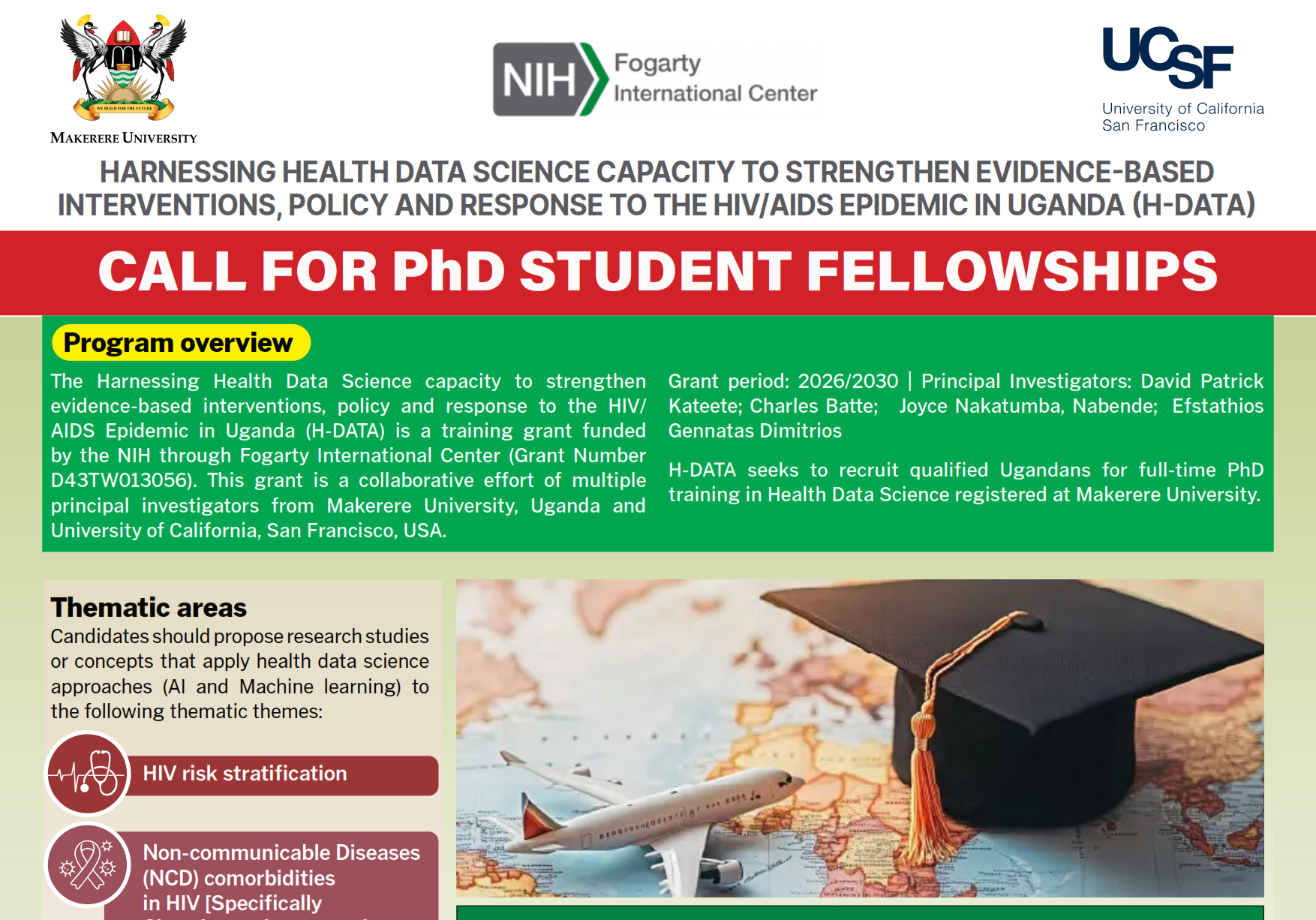
Program overview
The Harnessing Health Data Science capacity to strengthen evidence-based interventions, policy and response to the HIV/AIDS Epidemic in Uganda (H-DATA) is a training grant funded by the NIH through Fogarty International Center (Grant Number D43TW013056). This grant is a collaborative effort of multiple principal investigators from Makerere University, Uganda and University of California, San Francisco, USA.
Grant period: 2026/2030 | Principal Investigators: David Patrick Kateete; Charles Batte; Joyce Nakatumba, Nabende; Efstathios Gennatas Dimitrios
H-DATA seeks to recruit qualified Ugandans for full-time PhD training in Health Data Science registered at Makerere University.
Thematic areas
Candidates should propose research studies or concepts that apply health data science approaches (AI and Machine learning) to the following thematic themes:
- HIV risk stratification
- Non-communicable Diseases (NCD) comorbidities in HIV [Specifically Chronic respiratory and cardiovascular diseases / hypertension]
- HIV treatment outcomes, adherence, and long-term ART trajectories
- Non-Canonical HIV resistance mutations
- Digital medicine and real-world HIV data
- Health systems and policy analytics for HIV programs
Fellowship package
The PhD fellowship support is for up to three (3) years (full-time), subject to annual performance reviews and progress milestones. Successful scholars will be registered at Makerere University and may undertake sponsored didactic health data science methods training at the University of California, San Francisco (UCSF), USA, to receive additional skills development and mentorship in health data science research.
Application Information
| ELIGIBILITY Applicants should meet the following minimum requirements: – Master’s degree in Computer Science, Statistics/Biostatistics, Mathematics, Electrical Engineering, Bioinformatics, Epidemiology, Public Health, or another data-intensive discipline. – Demonstrated interest and/or experience applying data science methods/technologies to health research or health systems. – Strong quantitative or computational skills (e.g., programming, statistical analysis, machine learning, data management). – Ugandan citizenship and commitment to advancing health data science in Africa. – Ability to enroll in and complete full-time PhD training at Makerere University. Note: Additional program- or department-specific admission requirements may apply. Note: Proof of admission is not required at the time of application. However, preference will be given to applicants who have already secured admission to, or are currently registered in, a relevant PhD programme. | APPLICATION PACKAGE & SUBMISSION Submit the following documents by email as a single application package: – NIH Biosketch (maximum 4 pages) including relevant publications (if any). – Cover letter (maximum 1 page). – 2-page research concept note highlighting: research problem, specific aims, research design, and analysis plan. – Academic transcripts and certificates for the relevant Master of Science (MSc) degree. – Statement of purpose / motivational letter (maximum 800 words) for undertaking doctoral training in Health Data Science. – Two letters of recommendation with up-to-date contact details from academic referees. Email subject line (recommended): APPLICATION – Doctoral Scholarship – H-DATA PhD File naming convention (recommended): LastName_FirstName_DocumentName (e.g., Batte_Charles_CV.pdf) Application deadline: [February 28th 2026 by 5pm EAT] Program contact: [Dr Charles Batte at the address: hdatatraining@gmail.com] |
Research
International Fellows Recruitment – Wellcome Sanger Institute
Published
2 months agoon
January 8, 2026By
Mak Editor
The Wellcome Sanger Institute is seeking exceptional early career stage scientists to join the Institute as an International Fellow, contributing to the Institute’s scientific portfolio. Up to six fellowships available.
The Institute is an internationally outstanding genomic research centre with over 30 core faculty teams and 1,300 employees based south of Cambridge, UK.
Fellowship Eligibility:
- You are typically an early-mid career group leader/faculty usually up to nine years post PhD, based at a research organisation in a low- or middle-income country (LMIC). You may hold a faculty or equivalent position and are seeking to establish or strengthen your research team to develop an internationally recognised research portfolio. We also welcome applicants with equivalent experience, including those who have taken career breaks or followed non-traditional paths
- Your main research aims should be focused on your local country and research priorities which contributes to or complements the Institute’s scientific strategy through their expertise.
Closing date: 13th February 2026
Research
Makerere University Launches Knowledge-Sharing Platform to Drive Innovation and Economic Growth
Published
2 months agoon
December 19, 2025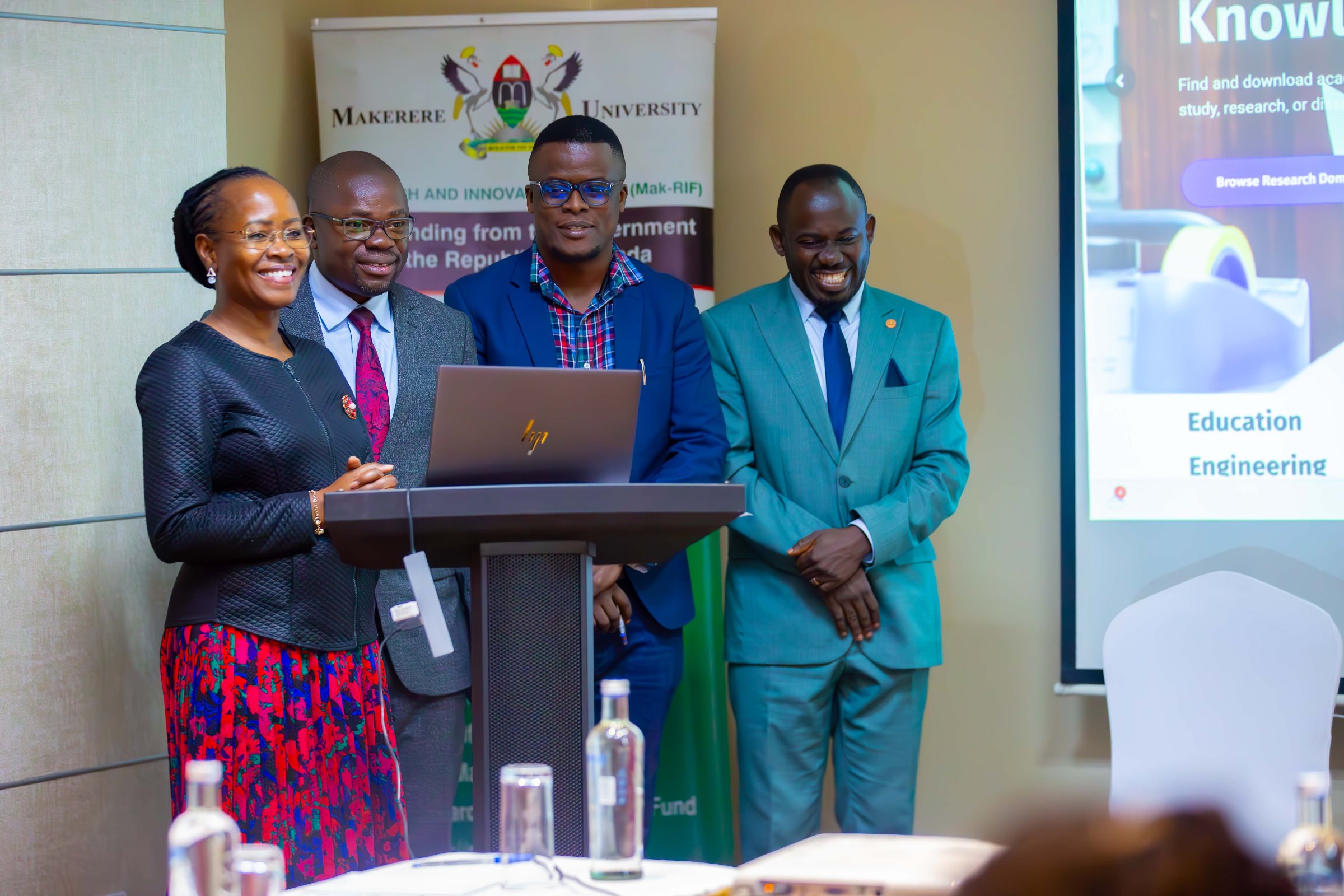
Makerere University has launched a knowledge-sharing platform designed to bridge research, education, and community outreach, with the aim of accelerating innovation and economic development in Uganda.
The platform is the outcome of a project led by Prof. Edward Bbaale, which examined how universities can translate research, innovations, and institutional capabilities into tangible impact for communities, businesses, and national economic growth, in line with the government’s tenfold growth agenda. The project was funded by the Government of Uganda through the Makerere University Research and Innovations Fund (Mak-RIF).
The study also explored how university-based research and innovation can be better aligned with Uganda’s development priorities in agriculture, tourism, mineral-based industrialization, and science and technology, as outlined in the Fourth National Development Plan (NDP IV).
Speaking at the launch, the First Deputy Vice-Chancellor for Academic Affairs, Prof. Sarah Ssali, said the platform would strengthen the link between academic research and societal transformation. She also noted that knowledge production and utilization is a political matter and urged researchers to meaningfully engage and participate in such converstaions.
Dr. Stephen Wandera, representing the Chairperson of the Mak-RIF Grants Management Committee, described the platform as timely and relevant, noting that it comes at a period when Makerere University is positioning itself as a research-led institution with measurable impact on communities and systems.
“The knowledge-sharing platform will enable researchers to disseminate their work to relevant audiences,” Dr. Wandera said. He added that dissemination workshops are among several avenues available for sharing research findings and urged the project team to explore additional channels, including policy briefs, academic publications, and online dialogue platforms.
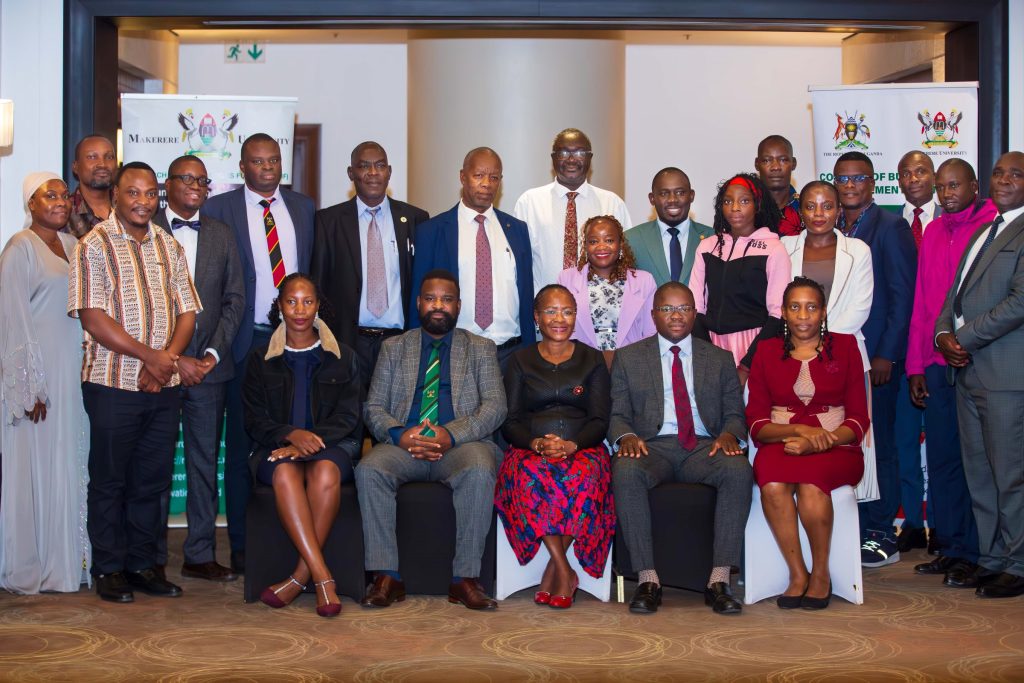
The Director of Research, Innovation, and Partnerships, Prof. Robert Wamala, said the dissemination workshop reflects Makerere University’s long-standing commitment to generating knowledge that responds to national priorities, advances innovation, and contributes to Uganda’s socio-economic transformation.
He added that the Directorate supports initiatives that move research beyond academic boundaries into practical application, policy influence, enterprise development, and community impact.
Dr. Peter Babyenda, the project’s Co-Principal Investigator, said the initiative combined research, outreach, and capacity-building activities, drawing lessons from global models where universities play a direct role in community development by supporting agriculture, industry, and the growth of Small and Medium Enterprises (SMEs) and Micro, Small, and Medium Enterprises (MSMEs).
Dean of the School of Economics, Prof. Ibrahim Michael Okumu, observed that while Uganda’s universities have produced substantial research, its translation into practical outcomes has remained slow. He cautioned that Makerere University’s relevance will ultimately be measured by the extent to which its work contributes to national development.
Dr. Babyenda noted that the platform will support the development of sustainable research, education, and outreach systems, helping to bridge the gap between university research and real-world application.
“As we launch this platform, I encourage academics, students, industry players, policymakers, and communities to actively engage with it,” Prof. Wamala said. “Let it serve as a living space for dialogue, learning, co-creation, and innovation.”
The knowledge-sharing platform is accessible to the public at www.dissemination.ug. Its launch took place at Sheraton Hotel in Kampala and was attended by officials from Makerere University, Kyambogo University, Gulu University, Mbarara University of Science and Technology (MUST), Busitema University, and Soroti University.
Trending
-

 Humanities & Social Sciences5 days ago
Humanities & Social Sciences5 days agoMeet Najjuka Whitney, The Girl Who Missed Law and Found Her Voice
-

 Health1 week ago
Health1 week agoUganda has until 2030 to end Open Defecation as Ntaro’s PhD Examines Kabale’s Progress
-

 General4 days ago
General4 days ago76th Graduation Highlights
-

 Agriculture & Environment1 week ago
Agriculture & Environment1 week agoUganda Martyrs Namugongo Students Turn Organic Waste into Soap in an Innovative School Project on Sustainable Waste Management
-

 General1 week ago
General1 week agoMastercard Foundation Scholars embrace and honour their rich cultural diversity